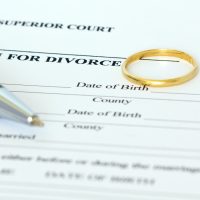Divorce Grounds in NJ

New Jersey, like every other state in modern times, allows for married parties to seek a “no-fault” divorce. Parties no longer need to prove that they were subjected to adultery or intolerable cruelty in order to obtain a divorce. People are free to divorce so long as the relationship between the couple has come to a proper end. New Jersey is not, however, a “pure” no-fault state. New Jersey still maintains a number of different grounds for divorce beyond the standard no-fault ground. While no-fault remains the most popular ground for divorce, parties are free to rely on other grounds should the situation call for it. Read on to learn about the grounds for divorce in New Jersey, and call a knowledgeable New Jersey divorce attorney with any questions or for help pursuing a divorce.
Irreconcilable Differences
The standard ground for no-fault divorce is known as “irreconcilable differences.” A party filing for divorce must allege that there are irreconcilable differences that have caused the breakdown of the marriage for at least six months, such that the marriage should be dissolved and there is no reasonable prospect of reconciliation. No specific “differences” must be alleged, merely that they exist and have existed for at least six months. If one party files for divorce and the other party wishes to stay married, that very disagreement could serve as proof of irreconcilable differences.
Separation
Separation is another no-fault ground for divorce. Separation is an available ground for divorce when the parties have lived separate and apart, in different habitations, for at least 18 consecutive months. The parties must also allege that there is no reasonable prospect for reconciliation, although after 18 months of separation the court will presume there is no likely reconciliation.
Willful Desertion
Willful desertion is much like separation, except that one party is blaming the other party. The party must allege willful and continued desertion of at least 12 months, which can be proven by demonstrating the parties have ceased to cohabit together.
Adultery
A party may file for divorce on grounds of extramarital conduct, sounding in adultery.
Addiction
A party may file for divorce based on their spouse’s “voluntarily induced addiction” to any narcotic drug, or habitual drunkenness for at least 12 months since the marriage began.
Extreme Cruelty
A party can seek a divorce based on their spouse’s extreme physical or mental cruelty. Cruelty means any physical or mental cruelty “which endangers the safety or health of the plaintiff or makes it improper or unreasonable to expect the plaintiff to continue to cohabit with the defendant.”
Imprisonment
A party may file for divorce if their spouse is imprisoned for a crime for at least 18 months after the marriage began. If the imprisoned party gets out of jail or prison before the complaint for divorce is filed, the parties must not have resumed cohabitation following the imprisonment.
Institutionalization for Mental Illness
A party may file for divorce if their spouse becomes institutionalized for mental illness for at least 24 months since the marriage began.
Deviant Sexual Conduct
A party may file for divorce if they were subjected to “deviant sexual conduct” voluntarily perpetrated by their spouse and without the consent of the filing party.
Call a Dedicated New Jersey Divorce Attorney for Advice and Representation
If you’re considering divorce or you need assistance with New Jersey family law issues involving parental rights, child custody, equitable division of property, alimony/spousal support, child support, or other family law matters in New Jersey, contact the seasoned and trial-ready Union family law attorney John B. D’Alessandro for a consultation.